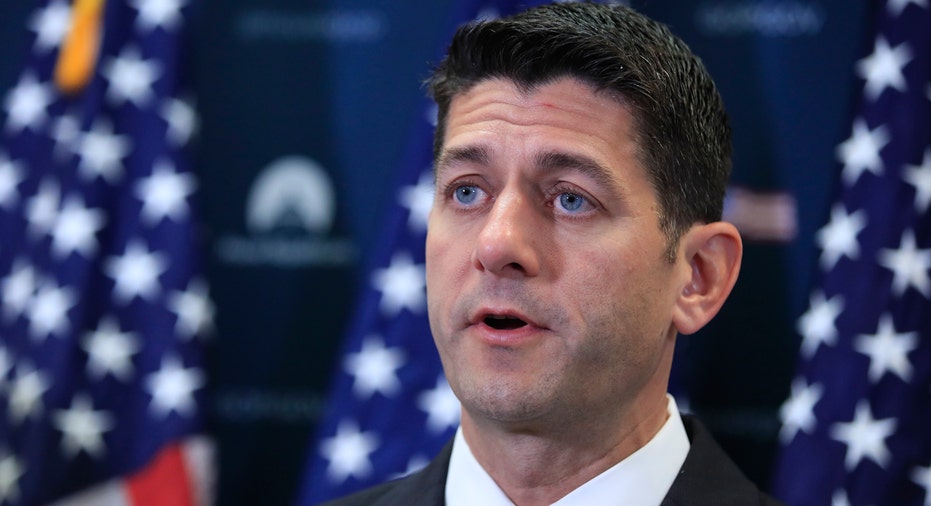Paul Ryan meets with DC powerhouses amid tax reform concerns

On the day the Senate failed to pass a replacement for the Affordable Care Act, House Speaker Paul Ryan (R-Wis.) held a meeting with some of Washington D.C.’s most powerful lobbyists and think tanks to assure them tax reform will not face the same issues as the debacle to repeal ObamaCare, FOX Business has learned.
On Friday, Ryan met with members of Americans for Tax Reform, The Heritage Foundation and FreedomWorks to give an update on tax reform negotiations and to reassure them that comprehensive tax reform will get done by the end of the year, FOX Business can confirm.
Grover Norquist, the founder of the Americans for Tax Reform political advocacy group and an attendee at the meeting, told FOX Business in an interview that Ryan indicated to those at the gathering that the group working on changing the tax code, which includes leaders from the House, Senate and White House, were “97 percent in agreement on tax reform after being at 80 percent.”
The team the House speaker was referring to is also known as the “Big 6” and consists of Ryan, House Ways and Means Committee Chairman Kevin Brady (R-Texas) , Senate Majority Leader Mitch McConnell (R-Ky.) Senate Finance Committee Chairman Orrin Hatch (R-Utah), as well as National Economic Council Director Gary Cohn and Treasury Secretary Steven Mnuchin.
According to Norquist, Ryan told the group that his team agreed to cut the corporate tax rate to as close to 15 percent as possible, work on eliminating the estate tax, also known as the “death tax,” close the loopholes for state and local tax deductions and the controversial border adjustment tax would not be part of their final plan.
Ryan did not say if they will be able to cut the corporate rate all the way down to 15 percent, but did note the “White House really wants 15 percent,” according to Norquist. Meanwhile, as FOX Business was first to report, Ryan has been telling his House colleagues that it’s unlikely the final tax plan will cut the corporate rate to as low as 15 percent and will likely see a cut between 20 percent and 25 percent.
Still, many of the representatives at the meeting voiced their concerns with trusting Congress to have new tax legislation ready to be signed for President Trump by the end of the year after the disastrous Senate vote to repeal ObamaCare.
According to Steve Moore, a distinguished visiting fellow at The Heritage Foundation and an outside adviser to the White House on tax reform, some attendees openly questioned Congress's ability to move ahead with putting together and eventually passing a comprehensive tax reform bill.
“What I feel that came out of this meeting is the question of how are you going to get this through the Senate? I’m all in favor of getting state and local tax deductions, but what about people in high tax states? I still don’t think it’s the winning strategy and that we should just do a straight tax cut. The biggest problem though here is we are losing time,” Moore told FOX Business in an interview.
Moore did not attend the meeting, but sent one of his aides from The Heritage Foundation to represent him.
A spokesman for FreedomWorks, a conservative advocacy group, confirmed to FOX Business their president, Adam Brandon, was also in attendance.
A spokeswoman for Ryan did not return emails for comment.
The idea of eliminating the state and local tax deductions would be controversial and possibly unpopular as Americans in 43 states would lose the option to deduct what they pay in taxes from their federal return, which lowers their overall tax bill.
While eliminating those deductions could save the federal government an enormous amount of money, it benefits Americans in New York, New Jersey and Connecticut the most. According to the Committee for a Responsible Federal Budget, about a third of the tax benefit goes to those three states.
The support for removing the so called “death tax” echoes what was described in the one page outline released in April by the Trump administration. The estate tax applies an additional tax to those who pass away with an estate worth more than $5.49 million. The idea behind it is to reduce the extent to which families can amass huge wealth over time.



















